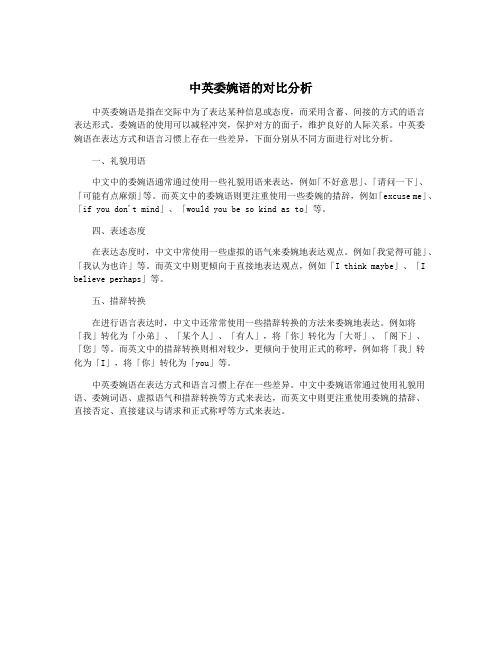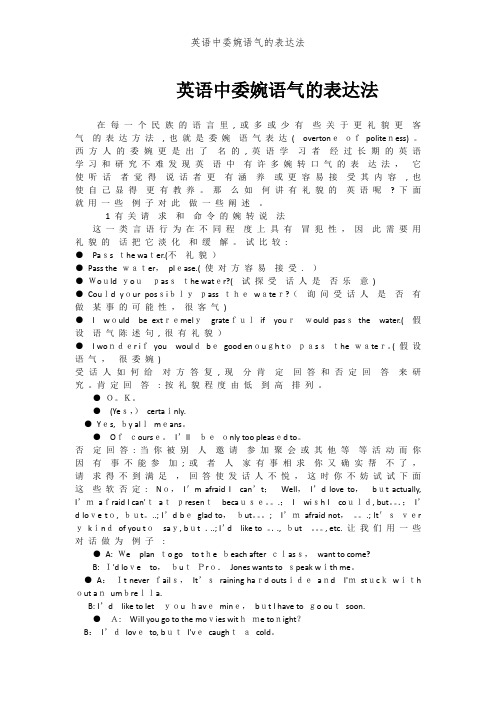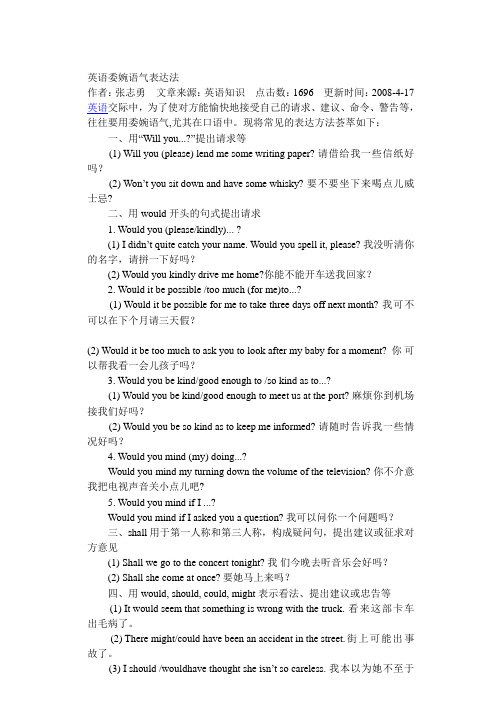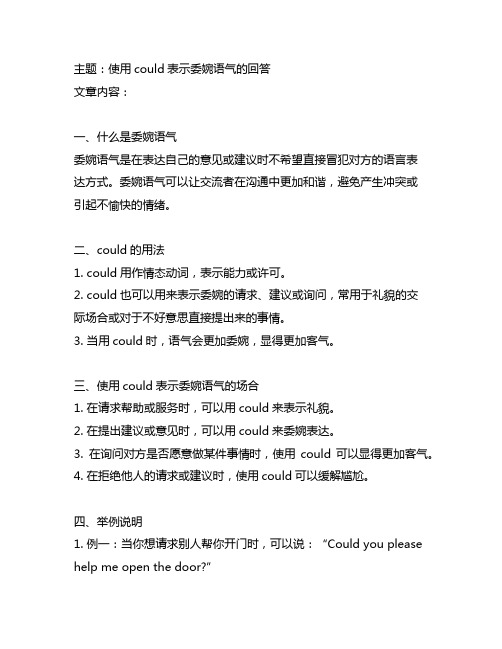英语中委婉语气的表达法
中英委婉语的对比分析

中英委婉语的对比分析
中英委婉语是指在交际中为了表达某种信息或态度,而采用含蓄、间接的方式的语言
表达形式。
委婉语的使用可以减轻冲突,保护对方的面子,维护良好的人际关系。
中英委
婉语在表达方式和语言习惯上存在一些差异,下面分别从不同方面进行对比分析。
一、礼貌用语
中文中的委婉语通常通过使用一些礼貌用语来表达,例如「不好意思」、「请问一下」、「可能有点麻烦」等。
而英文中的委婉语则更注重使用一些委婉的措辞,例如「excuse me」、「if you don't mind」、「would you be so kind as to」等。
四、表述态度
在表达态度时,中文中常使用一些虚拟的语气来委婉地表达观点。
例如「我觉得可能」、「我认为也许」等。
而英文中则更倾向于直接地表达观点,例如「I think maybe」、「I believe perhaps」等。
五、措辞转换
在进行语言表达时,中文中还常常使用一些措辞转换的方法来委婉地表达。
例如将「我」转化为「小弟」、「某个人」、「有人」,将「你」转化为「大哥」、「阁下」、「您」等。
而英文中的措辞转换则相对较少,更倾向于使用正式的称呼,例如将「我」转
化为「I」,将「你」转化为「you」等。
中英委婉语在表达方式和语言习惯上存在一些差异。
中文中委婉语常通过使用礼貌用语、委婉词语、虚拟语气和措辞转换等方式来表达,而英文中则更注重使用委婉的措辞、
直接否定、直接建议与请求和正式称呼等方式来表达。
英语中委婉语气的表达法

英语中委婉语气的表达法在每一个民族的语言里, 或多或少有些关于更礼貌更客气的表达方法, 也就是委婉语气表达(overtoneofpoliteness) 。
西方人的委婉更是出了名的, 英语学习者经过长期的英语学习和研究不难发现英语中有许多婉转口气的表达法,它使听话者觉得说话者更有涵养或更容易接受其内容, 也使自己显得更有教养。
那么如何讲有礼貌的英语呢? 下面就用一些例子对此做一些阐述。
1 有关请求和命令的婉转说法这一类言语行为在不同程度上具有冒犯性,因此需要用礼貌的话把它淡化和缓解。
试比较:●Pass the water.(不礼貌)●Pass the water,please.( 使对方容易接受.)●Would youpassthe water?(试探受话人是否乐意)●Could your possiblypass thewater?(询问受话人是否有做某事的可能性,很客气)●I would be extremelygratefulif yourwould passthe water.(假设语气陈述句, 很有礼貌)●I wonder ifyou wouldbegood enough topassthe water。
( 假设语气,很委婉)受话人如何给对方答复, 现分肯定回答和否定回答来研究。
肯定回答: 按礼貌程度由低到高排列。
●O。
K。
●(Yes,)certainly.●Yes, by allmeans。
●Ofcourse。
I’llbeonly too pleased to。
否定回答: 当你被别人邀请参加聚会或其他等等活动而你因有事不能参加; 或者人家有事相求你又确实帮不了,请求得不到满足,回答使发话人不悦,这时你不妨试试下面这些软否定:No,I'm afraid I can’t;Well,I’d love to,but actually, I’mafraid I can'tatpresentbecause。
英语委婉语气表达法

英语委婉语气表达法作者:张志勇文章来源:英语知识点击数:1696 更新时间:2008-4-17 英语交际中,为了使对方能愉快地接受自己的请求、建议、命令、警告等,往往要用委婉语气,尤其在口语中。
现将常见的表达方法荟萃如下:一、用“Will you...?”提出请求等(1) Will you (please) lend me some writing paper? 请借给我一些信纸好吗?(2) Won’t you sit down and have some whisky? 要不要坐下来喝点儿威士忌?二、用would开头的句式提出请求1. Would you (please/kindly)... ?(1) I didn’t quite catch your name. Would you spell it, please? 我没听清你的名字,请拼一下好吗?(2) Would you kindly drive me home?你能不能开车送我回家?2. Would it be possible /too much (for me)to...?(1) Would it be possible for me to take three days off next month? 我可不可以在下个月请三天假?(2) Would it be too much to ask you to look after my baby for a moment? 你可以帮我看一会儿孩子吗?3. Would you be kind/good enough to /so kind as to...?(1) Would you be kind/good enough to meet us at the port? 麻烦你到机场接我们好吗?(2) Would you be so kind as to keep me informed? 请随时告诉我一些情况好吗?4. Would you mind (my) doing...?Would you mind my turning down the volume of the television? 你不介意我把电视声音关小点儿吧?5. Would you mind if I ...?Would you mind if I asked you a question? 我可以问你一个问题吗?三、shall用于第一人称和第三人称,构成疑问句,提出建议或征求对方意见(1) Shall we go to the concert tonight? 我们今晚去听音乐会好吗?(2) Shall she come at once? 要她马上来吗?四、用would, should, could, might表示看法、提出建议或忠告等(1) It would seem that something is wrong with the truck. 看来这部卡车出毛病了。
英语中委婉语气的表达法

英语中委婉语气的表达法在每一个民族的语言里,或多或少有些关于更礼貌更客气的表达方法,也就是委婉语气表达( overtone of politeness)。
西方人的委婉更是出了名的,英语学习者经过长期的英语学习和研究不难发现英语中有许多婉转口气的表达法,它使听话者觉得说话者更有涵养或更容易接受其内容,也使自己显得更有教养。
那么如何讲有礼貌的英语呢?下面就用一些例子对此做一些阐述。
1 有关请求和命令的婉转说法这一类言语行为在不同程度上具有冒犯性,因此需要用礼貌的话把它淡化和缓解。
试比较:● Pass the water.(不礼貌 )● Pass the water, please.(使对方容易接受。
)● Would you pass the water?(试探受话人是否乐意)● Could your possibly pass the water?(询问受话人是否有做某事的可能性,很客气)● I would be extremely grateful if your would pass the water.(假设语气陈述句,很有礼貌)● I wonder if you would be good enough to pass the water.(假设语气,很委婉)受话人如何给对方答复,现分肯定回答和否定回答来研究。
肯定回答:按礼貌程度由低到高排列。
● O.K.● (Yes,) certainly.● Yes, by all means.● Of course. I'll be only too pleased to.否定回答:当你被别人邀请参加聚会或其他等等活动而你因有事不能参加;或者人家有事相求你又确实帮不了,请求得不到满足,回答使发话人不悦,这时你不妨试试下面这些软否定: No, I'm afraid I can't; Well, I'd love to, but actually, I'm afraid I can't at present because...; I wish I could, but...; I'd love to, but...; I'd be glad to, but...; I'm afraid not, ...; It's very kind of you to say, but ...; I'd like to ..., but ...,etc. 让我们用一些对话做为例子 :● A: We plan to go to the beach after class, want to come?B: I'd love to, but Pro. Jones wants to speak with me.● A: It never fails, It's raining hard outside and I'm stuck without an umbrella.B: I'd like to let you have mine, but I have to go out soon.● A: Will you go to the movies with me tonight?B: I'd love to, but I've caught a cold.● A: Could you possibly do me a favor?B: Sure, What is it?A: I've got a problem. I have to fix my table and I don't have a hammer. Could I possibly borrow yours? B: I'm sorry. I'm afraid I don't have one.A: Oh .Do you know anybody who does?B: Yes. You should call Charlie. I'm sure he'll be happy to lend you his.A: Thank you. I'll call him right away.● A: It's such a fine day, shall we go to the park for a walk?B: I'd like to join you, but I find it chilly to walk outside in spite of the sun.2 劝告的婉转法试比较下面句子(按从直截了当到较有礼貌的含蓄的劝告表达法排列)● You ought to type this paper.(有强加于人的意向 )● You really should slow down at your office.● You'd better tell him the truth.● I'd advise you to take a vacation.● You should take your parents' advice, they know what's best for you.● If I were you , I'd buy another car without hesitation.(含蓄地达到劝告目的)3 建议的表达法试比较:● I suggest you go for some advice.(不够礼貌,用于熟悉的人 )● I would suggest starting the work at once.(较委婉)● You can read the novel now if you like.(给人选择余地,较客气)● You could/might have a look at the novel.(客气)● Why not call me next weekend?(有礼貌的建议)● Why don't you find a decent job?(同 5))● Can /may/Could/might I suggest that...?(使受话人容易接受)● It would be better if you copy that again.(假设条件句,容易使人接受)● I wonder if I might make the suggestion that...(用在正式场合,比如外交家的审慎的辞令风格)4 如何利用某些时态婉转地表达自己种种想法从上面所举例子,我们不难发现英语中有些时态其实并不表示真正的时态,而是与英语中的委婉语气密不可分的,例如:4.1 某些实意动词( want, wonder, think, hope等)的过去时、现在进行时、过去进行时表现在时比直接用现在时态更婉转,如:● A: Did you want me?B: Yes, I wondered if you could give me some help.● It's time you had a holiday.● I wish you lived closer to us.● If only you lent your book to me.● I'm hoping you'll give us some advice.● I'm wondering if I may have a word with you.● I was wondering /wondered if you'd like to come out with me one evening.● I was hoping / hoped you could send me some books.上面所举例子实际上都可以用一般现在时来代替,但是就不如用一般过去时;现在进行时或过去进行时委婉。
could表示委婉语气的回答

主题:使用could表示委婉语气的回答文章内容:一、什么是委婉语气委婉语气是在表达自己的意见或建议时不希望直接冒犯对方的语言表达方式。
委婉语气可以让交流者在沟通中更加和谐,避免产生冲突或引起不愉快的情绪。
二、could的用法1. could用作情态动词,表示能力或许可。
2. could也可以用来表示委婉的请求、建议或询问,常用于礼貌的交际场合或对于不好意思直接提出来的事情。
3. 当用could时,语气会更加委婉,显得更加客气。
三、使用could表示委婉语气的场合1. 在请求帮助或服务时,可以用could来表示礼貌。
2. 在提出建议或意见时,可以用could来委婉表达。
3. 在询问对方是否愿意做某件事情时,使用could可以显得更加客气。
4. 在拒绝他人的请求或建议时,使用could可以缓解尴尬。
四、举例说明1. 例一:当你想请求别人帮你开门时,可以说:“Could you please help me open the door?”2. 例二:当你想提出建议时,可以说:“I think you could consider taking a differe nt approach.”3. 例三:当你想询问对方是否能否帮忙时,可以说:“Could you possibly lend me a hand with this?”4. 例四:当你不想接受他人的邀请时,可以说:“Thank you for inviting me, but I’m afraid I could not make it this time.”五、注意事项1. 虽然could表示了委婉语气,但在实际使用中也需要根据具体情况和对方的关系来灵活运用,避免误解或引起不必要的矛盾。
2. 语气的委婉与否,并不仅仅取决于could的使用,更主要的是表达者的语气、表情和态度。
3. 在跨文化交流中,不同国家和地区的人对于委婉语气的理解和运用也有所差异,需要注意和尊重对方的文化习惯。
中英委婉语的对比分析

中英委婉语的对比分析委婉语是一种言语表达方式,常用于礼貌、表达委婉情感、避免冲突等。
中英文委婉语的用法有所不同,接下来将对比分析中英文委婉语的表达方式。
1. 礼貌用语在中文中,我们常用“请”、“谢谢”等字眼表示礼貌。
例如:“请问您需要什么帮助?”、“谢谢你的耐心等待。
”等等。
在英文中,礼貌用语包括“Excuse me”,“Please”和“Thank you”。
“Excuse me”可以用于请求别人的注意或道歉,例如:“Excuse me, can I have a moment of your time?”“Please”表示请求或提醒,例如:“Please be careful, you might trip over that.”“Thank you”则表示感激之情,例如:“Thank you for your help.”2. 否定语气在中文中,我们常使用“不太好”、“有一点点问题”等词语来表示否定。
例如:“这道题我不太会。
”、“这个方案有一些小问题。
”3. 婉转拒绝在中文中,我们常使用“抱歉,我有其他的事要忙。
”、“我需要考虑一下。
”等方式婉转拒绝别人的请求。
在英文中,可以用“Sorry, I'm tied up at the moment.”、“I'll need to think about it first.”等方式婉转拒绝别人的请求。
4. 委婉表达在中文中,我们常使用“可能不太适合你”、“我的看法与你略有不同”等方式去委婉表达我们的意见。
5. 推销语在中文中,为了表现自己的自信和实力,会使用一些比较强烈的语言,如“我们公司产品最好”、“我们的服务最专业”。
总体来说,中英文委婉语的用法有所不同,但目的都是为了表达我们的想法和情感,并体现尊重、礼貌、文雅等。
在实际交流中,我们需要灵活运用不同的委婉语,以适应不同的情境和对话对象。
will 和would的用法
will 和would的用法一级标题:用法简介Will 和would是英语中常用的情态动词,它们在表达未来意义、推测和委婉语气时起到重要作用。
本文将详细介绍will 和would的几种主要用法。
二级标题1:表示未来意义在表示未来事件、计划或预测时,我们常常使用will。
它可以用于直接陈述将要发生的事情,也可以表示决定、承诺或预测。
例如:1. I will go to the party tomorrow.(明天我会去参加派对。
)2. She will probably win the competition.(她很可能会赢得比赛。
)此外,will 还可用于请求、建议或征询意见的场合。
例如:1. Will you please pass me the salt?(你能给我递一下盐吗?)2. I think you should see a doctor. It will be better for your health.(我想你应该去看医生,对你的健康更好。
)二级标题2:表示委婉语气Would 在委婉语气方面发挥着重要作用。
它被广泛用于礼貌地请求、邀请和提供帮助等场景中。
例如:1. Would you mind closing the window? It's too cold here.(你介意关上窗户吗?这里太冷了。
)2. Would you like to have dinner with me tonight?(你今晚愿意和我一起吃饭吗?)Would 还可用于表示习惯性动作或经常性的状态。
例如:1. When I was a child, I would visit my grandparents every summer.(当我还是个孩子的时候,每个夏天我都会去看望我的祖父母。
)2. He used to be very shy, but now he would talk to anyone.(他过去很害羞,但现在他可以和任何人交谈了。
英语委婉语研究
英语委婉语研究英语委婉语 (euphemism)是英语语言中一种独特而微妙的现象,它在人际交往中扮演着重要的角色。
通过使用委婉语,人们可以避免直接表达可能造成冒犯、尴尬或敏感的话题,从而维护人际关系的和谐与融洽。
本文将从以下几个方面对英语委婉语进行探讨和研究。
英语委婉语的起源可以追溯到古希腊和罗马时期,当时人们使用委婉语来避免直接提及神或死亡等敏感话题。
随着时间的推移,英语委婉语逐渐扩展到各个领域,包括政治、商业、医学和社交等。
在当代社会,英语委婉语的使用已经变得极为普遍,而且在一些特定领域和情境中,委婉语的使用已成为一种文化习惯和礼貌准则。
英语委婉语的主要特点包括间接性、模糊性和礼貌性。
间接性指委婉语不直接表达真实意图,而是通过暗示、比喻或其他修辞手法间接表达。
模糊性指委婉语的含义往往不够明确,可以适用于多种情境和解释。
礼貌性指委婉语的使用可以减轻直接言语可能造成的冒犯或尴尬,从而保持人际交往的和谐。
委婉语的主要功能包括:1)避免冒犯他人或引起冲突;2)掩饰真实意图或事实,减轻言语的直接冲击;3)维护自我形象或团体形象,避免被他人视为粗鲁或无礼的人;4)遵守社会和文化规范,维持人际关系和特定情境下的交际需要。
英语委婉语的表达方式多种多样,主要包括以下几种:借词:使用与原词相近或相关的词汇来代替直接表达。
例如,“to pass away”代替“to die”,“to go to sleep”代替“to die”。
修饰词:在原词前加上修饰词或形容词来弱化语气或改变含义。
例如,“accidental death”代替“death by accident”。
比喻:使用比喻来间接表达难以启齿或敏感的话题。
例如,“in the arms of Morpheus”代替“asleep”。
抽象概念:用抽象概念来代替具体事物,以减轻直接冲击。
例如,“a necessary evil”代替“war”。
否定表达:通过否定来减轻肯定的含义。
英语中委婉语气的表达法
英语中委婉语气的表达法在每一个民族的语言里,或多或少有些关于更礼貌更客气的表达方法,也就是委婉语气表达(overtone of politeness)。
西方人的委婉更是出了名的,英语学习者经过长期的英语学习和研究不难发现英语中有许多婉转口气的表达法,它使听话者觉得说话者更有涵养或更容易接受其内容,也使自己显得更有教养。
那么如何讲有礼貌的英语呢?下面就用一些例子对此做一些阐述。
1 有关请求和命令的婉转说法这一类言语行为在不同程度上具有冒犯性,因此需要用礼貌的话把它淡化和缓解。
试比较:●Pass the water.(不礼貌)●Pass the water, please.(使对方容易接受。
)●Would you pass the water(试探受话人是否乐意)●Could your possibly pass the water(询问受话人是否有做某事的可能性,很客气)●I would be extremely grateful if your would pass the water.(假设语气陈述句,很有礼貌)●I wonder if you would be good enough to pass the water.(假设语气,很委婉)受话人如何给对方答复,现分肯定回答和否定回答来研究。
肯定回答:按礼貌程度由低到高排列。
●.●(Yes,) certainly.●Yes, by all means.●Of course. I'll be only too pleased to.否定回答:当你被别人邀请参加聚会或其他等等活动而你因有事不能参加;或者人家有事相求你又确实帮不了,请求得不到满足,回答使发话人不悦,这时你不妨试试下面这些软否定:No, I'm afraid I can't; Well, I'd love to, but actually, I'm afraid I can't at present because...; I wish I could, but...; I'd love to, but...; I'd be glad to, but...; I'm afraid not, ...; It's very kind of you to say, but ...; I'd like to ..., but ...,etc. 让我们用一些对话做为例子:●A: We plan to go to the beach after class, want to comeB: I'd love to, but Pro. Jones wants to speak with me.●A: It never fails, It's raining hard outside and I'm stuck without an umbrella.B: I'd like to let you have mine, but I have to go out soon.●A: Will you go to the movies with me tonightB: I'd love to, but I've caught a cold.●A: Could you possibly do me a favorB: Sure, What is itA: I've got a problem. I have to fix my table and I don't have a hammer. Could I possibly borrow yours B: I'm sorry. I'm afraid I don't have one.A: Oh .Do you know anybody who doesB: Yes. You should call Charlie. I'm sure he'll be happy to lend you his.A: Thank you. I'll call him right away.●A: It's such a fine day, shall we go to the park for a walkB: I'd like to join you, but I find it chilly to walk outside in spite of the sun.2 劝告的婉转法试比较下面句子(按从直截了当到较有礼貌的含蓄的劝告表达法排列)●You ought to type this paper.(有强加于人的意向)●You really should slow down at your office.●You'd better tell him the truth.●I'd advise you to take a vacation.●You should take your parents' advice, they know what's best for you.●If I were you , I'd buy another car without hesitation.(含蓄地达到劝告目的)3 建议的表达法试比较:●I suggest you go for some advice.(不够礼貌,用于熟悉的人)●I would suggest starting the work at once.(较委婉)●You can read the novel now if you like.(给人选择余地,较客气)●You could/might have a look at the novel.(客气)●Why not call me next weekend(有礼貌的建议)●Why don't you find a decent job(同5))●Can /may/Could/might I suggest that...(使受话人容易接受)●It would be better if you copy that again.(假设条件句,容易使人接受)●I wonder if I might make the suggestion that...(用在正式场合,比如外交家的审慎的辞令风格)4 如何利用某些时态婉转地表达自己种种想法从上面所举例子,我们不难发现英语中有些时态其实并不表示真正的时态,而是与英语中的委婉语气密不可分的,例如:某些实意动词(want, wonder, think, hope等)的过去时、现在进行时、过去进行时表现在时比直接用现在时态更婉转,如:●A: Did you want meB: Yes, I wondered if you could give me some help.●It's time you had a holiday.●I wish you lived closer to us.●If only you lent your book to me.●I'm hoping you'll give us some advice.●I'm wondering if I may have a word with you.●I was wondering /wondered if you'd like to come out with me one evening.●I was hoping / hoped you could send me some books.上面所举例子实际上都可以用一般现在时来代替,但是就不如用一般过去时;现在进行时或过去进行时委婉。
委婉语表达法
委婉语表达法本单元的课题和语法焦点是关于提建议和征求意见的内容,现就如何提建议和征求意见作以归纳。
一、“What/ How about+名词/ 代词或v-ing?”表示建议。
What/ How about having an English evening? 举行一场英语晚会怎么样?How/ What about a trip to the beach on Sunday? 星期日去海滨玩一次怎么样?二、Would/ Could you please…?表示建议或请求时,would/ could 并非是动词过去式。
而是表示说话者语气较为委婉。
Could you please tell me how to get the post office? 请你告诉我怎么才能到邮局,好吗?三、用“Let”s+动词原形”表示建议。
Let”s go out for a walk. 我们出去散步吧!补给站:(1)这一句式的否定式可用Let”s not…或Don”t let us…。
Let”s not get up too early tomorrow.明天我们不要起得太早。
Don”t let us waste our time arguing!咱们别浪费时间再争论下去了。
(2)let”s 是let us的缩写形式,一般情况下两者可以互换,但略有区别:let”s的“我们”包括说话人和听话人双方,而let us不包括听话人在内。
Let”s play basketball. shall we?咱们打篮球好吗?Let us go with you, will you?请让我和你一起去,好吗?四、用“had better +动词原形”表示建议。
It”s getting late. We”d better go home by bus. 很晚了,我们最好乘车回家。
补给站:had better 中的had 并非指过去,而是指现在或将来,通用于各人称,在人称代词后常缩略为”d。
- 1、下载文档前请自行甄别文档内容的完整性,平台不提供额外的编辑、内容补充、找答案等附加服务。
- 2、"仅部分预览"的文档,不可在线预览部分如存在完整性等问题,可反馈申请退款(可完整预览的文档不适用该条件!)。
- 3、如文档侵犯您的权益,请联系客服反馈,我们会尽快为您处理(人工客服工作时间:9:00-18:30)。
英语中委婉语气的表达法在每一个民族的语言里,或多或少有些关于更礼貌更客气的表达方法,也就是委婉语气表达( overtone of politeness)。
西方人的委婉更是出了名的,英语学习者经过长期的英语学习和研究不难发现英语中有许多婉转口气的表达法,它使听话者觉得说话者更有涵养或更容易接受其内容,也使自己显得更有教养。
那么如何讲有礼貌的英语呢?下面就用一些例子对此做一些阐述。
1 有关请求和命令的婉转说法这一类言语行为在不同程度上具有冒犯性,因此需要用礼貌的话把它淡化和缓解。
试比较:● Pass the water.(不礼貌 )● Pass the water, please.(使对方容易接受。
)● Would you pass the water?(试探受话人是否乐意)● Could your possibly pass the water?(询问受话人是否有做某事的可能性,很客气)● I would be extremely grateful if your would pass the water.(假设语气陈述句,很有礼貌)● I wonder if you would be good enough to pass the water.(假设语气,很委婉)受话人如何给对方答复,现分肯定回答和否定回答来研究。
肯定回答:按礼貌程度由低到高排列。
● .● (Yes,) certainly.● Yes, by all means.● Of course. I'll be only too pleased to.否定回答:当你被别人邀请参加聚会或其他等等活动而你因有事不能参加;或者人家有事相求你又确实帮不了,请求得不到满足,回答使发话人不悦,这时你不妨试试下面这些软否定: No, I'm afraid I can't; Well, I'd love to, but actually, I'm afraid I can't at present because...; I wish I could, but...; I'd love to, but...; I'd be glad to, but...; I'm afraid not, ...; It's very kind of you to say, but ...; I'd like to ..., but ..., etc. 让我们用一些对话做为例子 :● A: We plan to go to the beach after class, want to come?B: I'd love to, but Pro. Jones wants to speak with me.● A: It never fails, It's raining hard outside and I'm stuck without an umbrella.B: I'd like to let you have mine, but I have to go out soon.● A: Will you go to the movies with me tonight?B: I'd love to, but I've caught a cold.● A: Could you possibly do me a favor?B: Sure, What is it?A: I've got a problem. I have to fix my table and I don't have a hammer. Could I possibly borrow yours? B: I'm sorry. I'm afraid I don't have one. A: Oh .Do you know anybody who does?B: Yes. You should call Charlie. I'm sure he'll be happy to lend you his.A: Thank you. I'll call him right away.● A: It's such a fine day, shall we go to the park for a walk?B: I'd like to join you, but I find it chilly to walk outside in spite of the sun.2 劝告的婉转法试比较下面句子(按从直截了当到较有礼貌的含蓄的劝告表达法排列)● You ought to type this paper.(有强加于人的意向 )● You really should slow down at your office.● You'd better tell him the truth.● I'd advise you to take a vacation.● You should take your parents' advice, they know what's best for you.● If I were you , I'd buy another car without hesitation.(含蓄地达到劝告目的)3 建议的表达法试比较:● I suggest you go for some advice.(不够礼貌,用于熟悉的人 )● I would suggest starting the work at once.(较委婉)● You can read the novel now if you like.(给人选择余地,较客气)● You could/might have a look at the novel.(客气)● Why not call me next weekend?(有礼貌的建议)● Why don't you find a decent job?(同 5))● Can /may/Could/might I suggest that...?(使受话人容易接受)● It would be better if you copy that again.(假设条件句,容易使人接受)● I wonder if I might make the suggestion that...(用在正式场合,比如外交家的审慎的辞令风格)4 如何利用某些时态婉转地表达自己种种想法从上面所举例子,我们不难发现英语中有些时态其实并不表示真正的时态,而是与英语中的委婉语气密不可分的,例如:某些实意动词( want, wonder, think, hope等)的过去时、现在进行时、过去进行时表现在时比直接用现在时态更婉转,如:● A: Did you want me?B: Yes, I wondered if you could give me some help.● It's time you had a holiday.● I wish you lived closer to us.● If only you lent your book to me.● I'm hoping you'll give us some advice.● I'm wondering if I may have a word with you.● I was wondering /wondered if you'd like to come out with me one evening.● I was hoping / hoped you could send me some books.上面所举例子实际上都可以用一般现在时来代替,但是就不如用一般过去时;现在进行时或过去进行时委婉。
如:I was wondering whether you could help me do something on our wedding.这是一句非常礼貌的话,比“ Could you help me do something on our wedding?"要客气得多。
它用的是过去进行时,表达的意思却是现在。
这句话可以翻译成:“不知能否劳驾您在我们婚礼上帮我做点事情?”如果我们沿用传统的时态概念,把这句话改成后者,那么,整句话的语气大变,显得生硬。
更遭的是,句子产生了两种负面意义:我不知道你帮不帮我做这件事;对你否帮我做这事,我持怀疑态度。
而用过去进行时,则不会产生以上错误理解。
一些情态动词或其他动词的过去时也用来表示委婉语气,实际上是虚拟语气,表假设、愿望、建议、猜测、怀疑而已。
而没有时间上的差别,如:● She might have missed the train.(既是虚拟语气,也表委婉)。
● We might all have been indulging in an illusion.● It might be an idea to try this one again.● I would suggest you copied this out again.● Sally couldn't love him.● It would be better if you wrote in ink..● You'd(You had) better be careful next time.● I'd rather you finished this off before Friday.● I'd rather you didn't look at the answer or ask others for help.● This handbag could be Mary's.● A: Could/might I smoke here?B: Yes, of course you can. /No, I'm afraid not. ● Should I turn off the light?● What should we do next?● I should say he is just the right man for this job.● I should think your approach is correct.● I don't think he would be so absent- minded.● It would be a pity to stop our work half- way.● Would you like to stay here for the night?● What would you advise me to do?● If I had a chance, I'd major in economics.● It's a pity if they should be so obstinate● I wouldn't go there unless they should force me to go.● We would reduce our price rather than lose the business.假如上面例子的时态变成现在时的话,意思虽然没变,但语气就不如用用过去式婉转。
